May 22, 2025 | 16:21 GMT +7
May 22, 2025 | 16:21 GMT +7
Hotline: 0913.378.918
May 22, 2025 | 16:21 GMT +7
Hotline: 0913.378.918
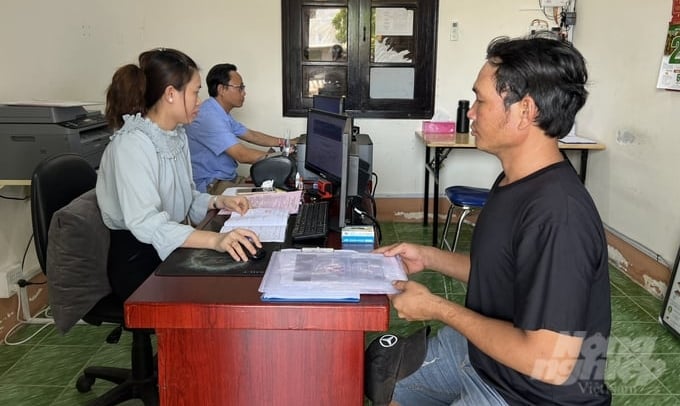
Fishermen submitting logbooks before departing for a fishing trip. Photo: Trong Linh.
Recent efforts to combat illegal, unreported, and unregulated (IUU) fishing, namely preventing illegal fishing activities in foreign waters, have been a particular focus for Ca Mau province. Accordingly, the entire local governmental system has vigorously mobilized stakeholders to participate in this concerted endeavor.
With a coastline stretching over 254 kilometers, Ca Mau province is endowed with spacious fishing grounds, presenting substantial potential and advantages for the development of the fisheries sector. According to statistics, the total output of fisheries exploitation in Ca Mau province exceeded 236,000 tons in 2022.
With the aim of improving the local residents' level of awareness, various levels of government and sectors within the province have implemented a flexible range of measures. This involves a combination of public awareness campaigns, inspections, monitoring, and the enforcement of penalties with clear responsibilities assigned to each level, sector, and leadership figure.
In addition to organizing awareness campaigns on IUU fishing regulations for the fishing community, local governments in coastal provinces and cities have collaborated with functional forces to prevent vessel owners from violating in foreign waters. On the other hand, these local governments have compiled lists of high-risk fishing vessels that frequently operate outside the province, subsequently bringing them under management for close monitoring.
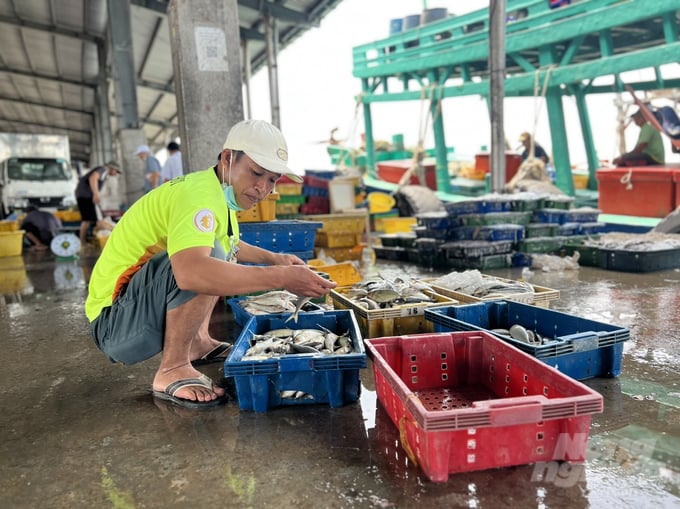
Ca Mau province has effectively carried out measures to combat illegal, unreported, and unregulated (IUU) fishing, namely illegal fishing activities in foreign waters. Photo: Trong Linh.
Mr. Pham Anh Khuong, Director of Song Doc Fishing Port and Anchorage Area in Ca Mau province, stated: "In order to enhance awareness and compliance with legal regulations regarding IUU fishing, the unit regularly broadcasts information through the loudspeaker system and directly distributes leaflets to vessel owners, captains, and seafarers at the port. According to the recommendations of the European Commission, the fisheries control representative office has increased the inspection rate to 100% for for fishing vessels departing from the portwith a length of at least 15 meters. Additionally, inspections are conducted for fishing offloading at the port and the submission of fishing logs and catch reports."
"Presently, fishing vessels must inform the port management one hour before arriving at or departing from the port. Vessel owners must provide information such as registration number, estimated time of arrival at the port, and estimated volume of catch travelling through the port. Subsequently, port management officials will arrange a docking site for the vessel and take photos of the vessel at the time of arrival, notifying the port management and the IUU office through Zalo. Additionally, the vessel captain will submit the fishing log, fishing license, technical safety certificate, registration and inspection certificates for their vessel, as well as crew roster, and their relevant qualifications and certificates," Mr. Khuong explained.
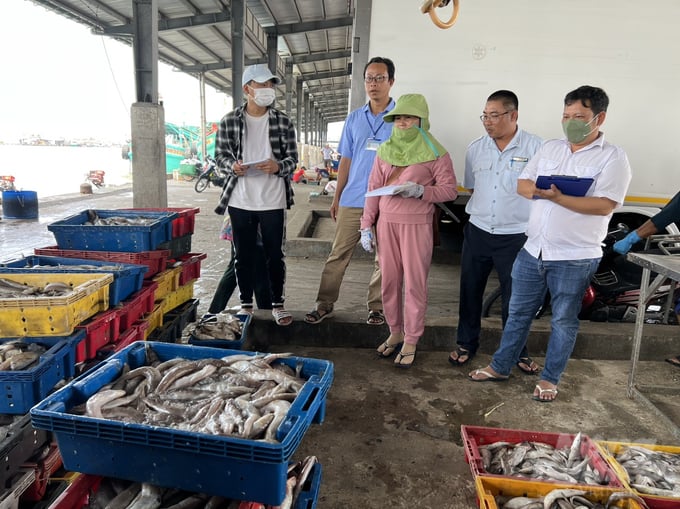
Officials inspecting the seafood catch volume at Song Doc Fishing Port. Photo: Trong Linh.
Mr. Do Trung Hau, a member of the inspection team responsible for the Song Doc fishing vessel, stated: "Thanks to the awareness campaigns and close coordination among units at the port, fishermen have shown significant improvements in their compliance with anti-IUU fishing regulations, especially in terms of notifying the port management one hour before arriving at or departing from the port, and submitting the fishing log."
Mr. Tran Dung Khanh, owner of the fishing vessel CM 97930TS specializing in transporting seafood, shared his insight: "When purchasing seafood from other fishing vessels, we must record the quantity and species of the purchased seafood. Finally, we must submit this information to the border patrol team."
Mr. Nhat Truong from Ward 7, Song Doc Town, shared: "In addition to the installation of monitoring equipment on fishing vessels and commitments not to violate in foreign waters, I must record a fishing log with detailed information regarding the schedule, fishing ground, and specific quantities by species for each fishing trip.
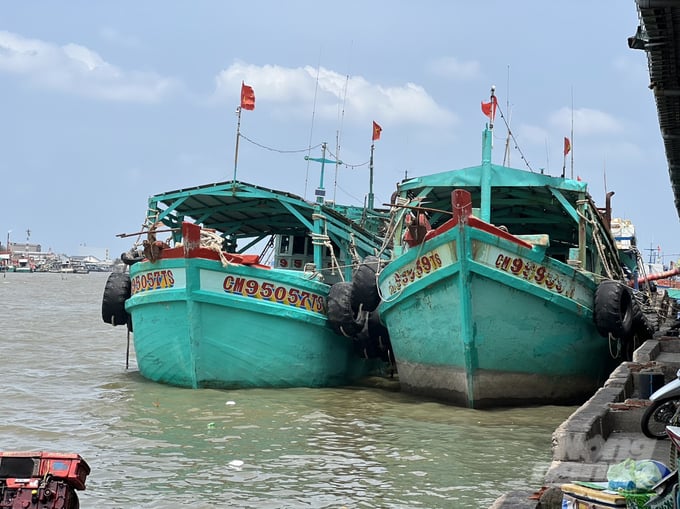
Fishing vessels docked in accordance with guidance from the Song Doc Fishing Port management. Photo: Trong Linh.
In addition to legal campaigns and education, law enforcement agencies have handled and penalized vessels violating IUU fishing regulations in accordance with Decree No. 42/2019/ND-CP and the 2017 Law on Fisheries. These agencies are actively implementing the installation of vessel monitoring systems for local fishing fleets, including fishing vessels, logistics service vessels, and aquatic product vessels with a minimum length of 15 meters.
With the aim of expediting the installation progress, the Ca Mau Provincial Anti-IUU Fishing Steering Committee has instructed local governments to review and compile data for each violation case. Subsequently, local governments can implement targeted communication measures and remind vessel owners to install VMS equipment as required. The fisheries control representative office has also strengthened the management, inspection, and control of violating vessels. Accordingly, they have prevented violating fishing vessels from engaging in fishing activities by withholding fishing licenses until the vessel monitoring systems are installed.
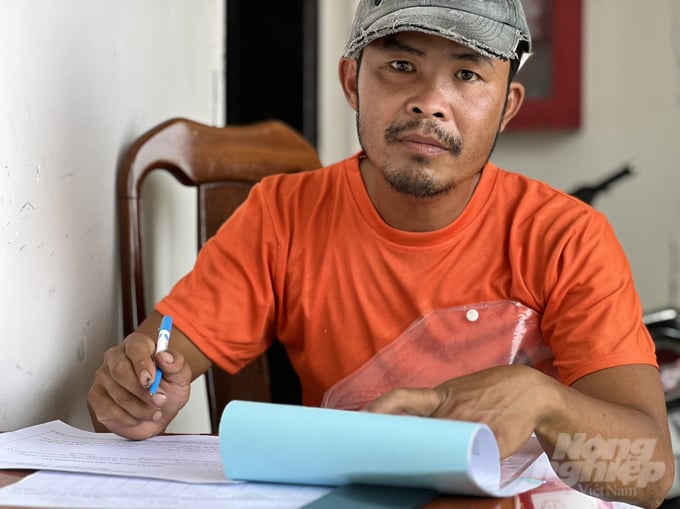
Thanks to guidance from the specialized sector, fishermen in Cà Mau province have strictly adhered to the regulations on anti-IUU fishing. Photo: Trong Linh.
Before departing on fishing trips, vessel owners or captains will notify the port management one hour in advance. The port management will cross-check the vessel number with the list of vessels involved in illegal fishing and vessels at high risk of violating in foreign waters. Subsequently, the port management will notify the border patrol forces and the Sub-Department of Fisheries at the Fisheries Office to inspect pre-departure requirements, such as the installation of vessel monitoring systems, registration certificates, and fishing licenses.
According to local governments, although cases of fishing vessels and fishermen violating in foreign waters have been partially controlled, many potential risks remain. Notably, offshore fishing vessels, especially vessels located in the vicinity of the borders of neighboring countries, often disconnects their vessel monitoring systems at sea. This group of fishing vessels frequently stays and departs outside the province. Violations with regards to fisheries exploitation under the 2017 Law on Fisheries and IUU violations in Ca Mau province have decreased marginally.
Ca Mau province houses a total of 4,291 fishing vessels, including 1,565 offshore fishing vessels. All offshore fishing vessels have installed vessel monitoring systems and marked the vessels as per regulations, achieving a compliance rate of 100%. The province has fully updated local vessel data on the VNFishbase software system and the vessel monitoring system.
Translated by Nguyen Hai Long
![Reducing emissions from rice fields: [2] Farmers’ commitment to the soil](https://t.ex-cdn.com/nongnghiepmoitruong.vn/608w/files/news/2025/05/05/dsc08881jpg-nongnghiep-140632.jpg)
(VAN) Clean rice cultivation model in Thuong Tan commune, Bac Tan Uyen district, is assisting local residents in achieving sustainable agriculture by substantially reducing costs, increasing productivity, and protecting the environment.

(VAN) At the conference to disseminate Resolution No. 68, AgriS introduced its digital agricultural ecosystem and reaffirmed its commitment to accompanying the Government in promoting private sector development and sustainable agriculture.

(VAN) 'Blue Ocean - Blue Foods' initiative is designed to restore marine ecosystems and establish sustainable livelihoods for local communities by cultivating a minimum of 1,000 hectares of cottonii seaweed in the first three years.
/2025/05/21/4642-3-112707_603.jpg)
(VAN) The V-SCOPE project has made direct contributions to three out of six pillars of the Comprehensive Strategic Partnership between Vietnam and Australia.

(VAN) Facing the threat of rabies spreading to the community, Gia Lai province urgently carries out measures to vaccinate dogs and cats on a large scale.

(VAN) Disease-free livestock farming not only protects livestock herds but also stabilizes production and livelihoods for many farmers in Tuyen Quang.

(VAN) Japan's grant aid project contributes to capacity building, promoting organic agricultural production, and fostering sustainable community development in Dong Thap province.